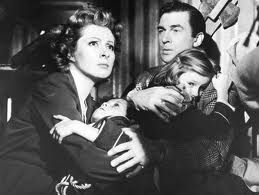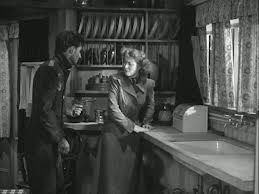
A great movie portraying the effects of WWII on a group of villagers living near London. The beginning of the movie portrays their village as close to idyllic. Mrs. Miniver, the lead character, is beloved and respected by her husband and her 3 children (and an elderly man working at the train station that names a rose after her). Her main concern is whether or not she was over-extravagant in the purchase of a hat.
 When the war begins, the peace of the village is quickly shaken. Air raids begin. Bombings (they are very stiff upper lip about it -showing a lot of courage). The men are called on to take their boats (mostly small) 40 miles to Dunkirk to evacuate troops trapped there. Mrs. Miniver's eldest son, Vin, joins the RAF. He is lucky to be stationed nearby, and whenever he flies over his house, he stalls his engine to let his mother know he is safe, which is touching.
When the war begins, the peace of the village is quickly shaken. Air raids begin. Bombings (they are very stiff upper lip about it -showing a lot of courage). The men are called on to take their boats (mostly small) 40 miles to Dunkirk to evacuate troops trapped there. Mrs. Miniver's eldest son, Vin, joins the RAF. He is lucky to be stationed nearby, and whenever he flies over his house, he stalls his engine to let his mother know he is safe, which is touching.In a tense scene, a crashed Nazi pilot enters Mrs. Minniver's home when her husband is gone, and demands food and drink while holding her at gunpoint. He eventually collapses from wounds he sustained in the crash, and she is able to take the gun and call the police. In a humorous scene later, after her husband mentions that she must have had a relaxing day, she mentions the incident. When he is shocked and asks if the man was armed, she casually responds "Well, yeah, he had a gun...I took it from him and called the police."

The movie also follows the budding romance between Vin and a local aristocrat's granddaughter, Carol, as they fall in love and decide to get married sooner rather than later because of the war. I spent much of the movie afraid that Vin was going to die, knowing the high mortality rates of RAF pilots, and was completely taken aback by the death of Carol when she gets hit by shrapnel during a bombing. Heart wrenching.
A powerful movie about the high cost of war on the home front as well as on the battlefield. Interesting, as Tyler pointed out, that it was made before the end of the war. Before anyone knew how the war would end. It was from the perspective of those going through the war at the time, and is summed up in the sermon of the village preacher at the end of the movie:
 "We in this quiet corner of England have suffered the loss of friends very dear to us, some close to this church. George West, choirboy. James Ballard, stationmaster and bellringer, and the proud winner only an hour before his death of the Beldon Cup for his beautiful Miniver Rose. And our hearts go out in sympathy to the two families who share the cruel loss of a young girl who was married at this altar only two weeks ago. The homes of many of us have been destroyed, and the lives of young and old have been taken. There's scarcely a household that hasn't been struck to the heart. And why? Surely you must have asked yourselves this question? Why in all conscience should these be the ones to suffer? Children, old people, a young girl at the height of her loveliness? Why these? Are these our soldiers? Are these our fighters? Why should they be sacrificed?
"We in this quiet corner of England have suffered the loss of friends very dear to us, some close to this church. George West, choirboy. James Ballard, stationmaster and bellringer, and the proud winner only an hour before his death of the Beldon Cup for his beautiful Miniver Rose. And our hearts go out in sympathy to the two families who share the cruel loss of a young girl who was married at this altar only two weeks ago. The homes of many of us have been destroyed, and the lives of young and old have been taken. There's scarcely a household that hasn't been struck to the heart. And why? Surely you must have asked yourselves this question? Why in all conscience should these be the ones to suffer? Children, old people, a young girl at the height of her loveliness? Why these? Are these our soldiers? Are these our fighters? Why should they be sacrificed?I shall tell you why. Because this is not only a war of soldiers in uniform. It is the war of the people, of all the people. And it must be fought not only on the battlefield but in the cities and in the villages, in the factories and on the farms, in the home and in the heart of every man, woman and child who loves freedom. Well, we have buried our dead, but we shall not forget them. Instead they will inspire us with an unbreakable determination to free ourselves, and those who come after us, from the tyranny and terror that threaten to strike us down. This is the People's War. It is our war. We are the fighters. Fight it then. Fight it with all that is in us. And may God defend the right."
Greer Garson was amazing. Couldn't place Mr. Miniver until I finally looked him up. Walter Pidgeon who played the preacher in How Green Was My Valley! He's Canadian and didn't try for a British accent, just as he didn't try for a Welsh accent in Valley.
One additional note: The scene in which Lady Beldon concedes the award for best rose at the flower show must have inspired Downton Abbey's very similar scene.
No comments:
Post a Comment